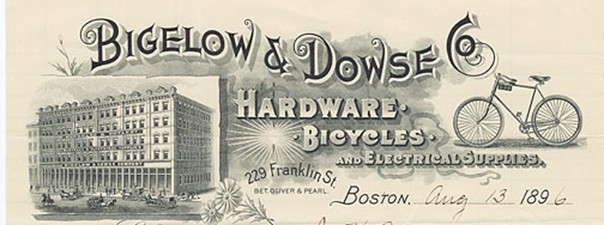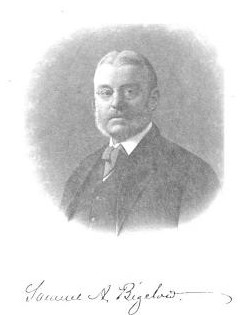
Samuel Augustus Bigelow has been
connected for many years with the hardware industry of America. Many
men have been interested in his views and ideas concerning the trade
because they have felt that his influence was to eventually benefit
them, and they have learned to trust and depend upon his advice. He is
a pioneer in the business, and wisely chosen by his colleagues for
every position of honor or importance that they have conferred upon
him. The golden anniversary of his career in the business world, which
occurred on October 12, 1905, was a testimony to the universal esteem
in which he is held by his friends all over the country. Over fifty
years of uninterrupted experience gives him preeminence as an expert in
his line.
He was brought up at Nonantum Vale on the
Faneuil estate. Enjoying as he did a life of freedom he naturally
sought what was most to his liking. His adventurous spirit soon
disclosed to him the resources within his reach. He indulged his
redundancy of good health and spirits in out-of-door sports and with
the presage of youth investigated the mechanical realm. His experiments
with tools delighted and entertained him.
Mr. Bigelow inherits the marked business
characteristics of the father whose name he bears. Samuel Bigelow, the
father, who was largely interested in real estate, was a very
successful man. He was accredited as possessing marked shrewdness and
discernment. He was born August 22, 1807, and lived until October 11,
1901. His earliest ancestor, who came to this country and settled at
Watertown, Massachusetts, in 1630, was John Bigelow. Mr. Samuel
Augustus Bigelow's mother was Anna Jane (Brooks) Bigelow, who was a
descendant from Captain Brooks, who came to America and settled in
Concord, Massachusetts, about 1630. Mr. Bigelow's ancestors
were represented in many of the Colonial Wars, and continued
through each succeeding generation to respond to their country's call.
At Lexington and Bunker Hill their names were recognized as berlonging
to the heroes who were famous in the history of those times. The
records of the State of Massachusetts show these families to have been
prominent in law, medicine, and as merchants.
The date of Mr. Samuel Augustus Bigelow's birth is
November 26, 1838. His native city is Charlestown, Massachusetts. His
mother, so highly esteemed for her gentleness and sincerity, was always
his best authority in distinguishing between right and wrong, and her
influence is a lasting legacy which she early bequeathed to him. To her
example and advice, he refers in the most glowing terms, and asserts
that "they have always been a guiding influence for all that is good."
His education was obtained in the public schools of Brighton, which now
forms a part of Boston. He finished the high school course, and
prepared himself for further advancement in a college course, but his
desire to mingle in the business world asserted itself, and he gave up
the idea of going to college. In the year 1855 he entered the hardware
house of Eaton & Palmer, then located on Congress Street,
Boston. He worked in the capacity of errand boy, shipper and
general assistant in the office, doing whatever he undertook with
accuracy and dispatch. His attitude was always one of confidence that
he would succeed in whatsoever he attempted. In 1856 this firm
consolidated with Lovett & Wellington, forming the house of Eaton,
Lovett & Wellington. Mr. Bigelow was the only clerk in the old
house that remained with new. He was radiant with hope, and although he
started on only fifty dollars per year, and worked for three years with
an increase to one hundred and twenty-five dollars per year, he soon
became a prosperous salesman, and the time sped rapidly until 1864,
when the firm of Homer, Bishop & Company was founded in which he
became a partner in 1866. He traveled for eight years over the states
of Vermont and New Hampshire, making many staunch and reliable friends
and establishing a large and profitable business, much of which remains
in connection with his present company. It was in the fall of 1872,
when the appalling conflagration of Boston destroyed every jobbing
hardware house in the city, that the firm of Homer, Bishop &
Company, was dissolved, and the new firm of Macomber, Bigelow &
Dowse was founded. Through necessity they were forced to occupy
chambers in Batterymarch Street, as there were no available quarters on
the ground floor left after the fire. In 1873 Mr. Bigelow assumed
exclusive control of the buying department, and through his general
sagacity and courteous bearing he has greatly enhanced the
opportunities of the business, and formed for it a valuable circle of
friends who hold him in highest respect. In 1884 John F. Macomber
retired on account of illness, and the new firm of Bigelow & Dowse
was founded, composed of Samuel A. Bigelow and Charles F. Dowse. In
1894 this firm was incorporated under the laws of the Commonwealth of
Massachusetts, as the Bigelow & Dowse Company, which still
continues. One night in January, 1903, the business house of the firm,
which had prospered so steadily and surely, was destroyed by fire, but
Mr. Bigelow and his partner were not long in mastering the situation.
In temporary quarters they were soon in a position to fill all their
orders which poured in upon them from their old customers as
uninteeruptedly as though nothing had interfered with their fulfilment.
Such was the confidence established with their customers and the
manufacturers, that but littler depression was caused by the
catastrophe, and almost immediately their new store was rebuilt on the
old site and filled with a new and complete stock.
A meeting of a few hardware jobbers in 1893
resulted in the New England Iron & Hardware Association of which
Mr. Bigelow was elected first president. He established the
precedent of holding office only one year, which custom still prevails.
He was then chosen to represent the Association in the Boston
Associated Board of Trade. In this capacity he served until 1899, when
he was again elected to the Boston Associated Board of Trade,
completing his term in October, 1903. In 1894 he was the only
representative from New England at that first meeting at Cleveland, out
of which grew the National Hardware Association. At that meeting he was
elected a member of the executive committee, which office he held
continuously, with the exception of one year, until the meeting in
Atlantic City in November, 1903. There he was elected president. He had
expressed a wish that his services be exempt from this responsibility,
but the overwhelming earnestness of the members of the association and
of his many friends from near and far who were present, prevailed, and
he quickly rose to the occasion with his response of generous
acquiescence to their wishes, and assumed the duties and honors pressed
upon him with a gracefulness and willingness thjft endeared him to the
hearts of all assembled. He made many intimate and lasting friendships
as president and member of the executive committee. He was reelected
president in 1904. In 1905 he was elected a permanent member of the
Advisory Board. Mr. Bigelow has seen many changes and evolutions in the
hardware trade, and settled many problems for himself and others that
tended to elevate its standard. He states that the hardware man's
limited sphere has enlarged until now, "he has more need to use his
head than his hands" to make his business successful. Mr. Bigelow
belongs to the Republican party, to which he has always remained loyal.
He is one of the founders of the Anvil Club, afterwards changed to the
Hardware Buyers Association; also master of the lodge of Eleusis; a
member of the Eastern Yacht Club; Exchange Club; Athletic Club and
others. He married Miss Ella H. Brown, daughter of Harriet B. and Seth
E. Brown, on November 7, 1867. Their only child is Samuel Lawrence
Bigelow, now a professor of chemistry. Mr. Bigelow states that his
motto in life is to "Follow the Golden Rule."




